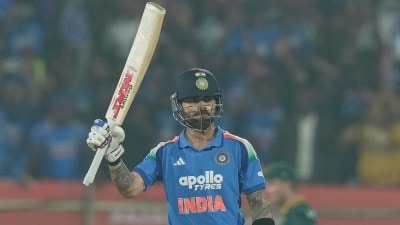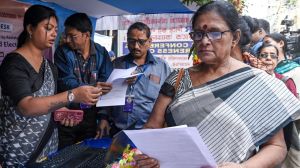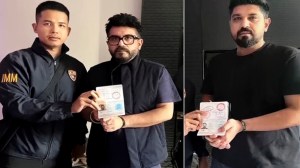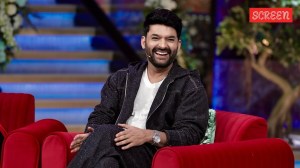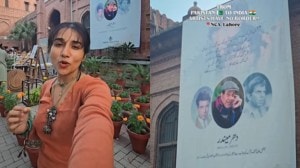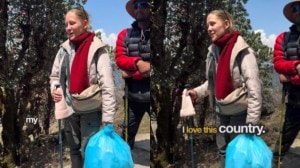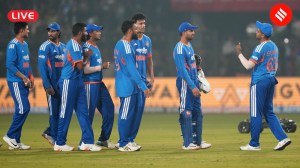Addressing the 25th edition of Jahan-e-Khusrau in Delhi, Prime Minister Narendra Modi showered praise on the Sufi tradition and Amir Khusrau, the 13th century Sufi poet and musician. He lauded Sufism as India’s pluralistic heritage, saying its saints recited the verses of Quran and also listened to the Vedas.
PM Modi’s speech at the Sufi cultural event is in line with the ruling BJP’s consistent move to reach out to the members associated with the Sufi tradition in the country.

As part of this outreach, the BJP Minority Morcha has brought on board 14,000 people associated with the Sufi khanqahs or sites from across the country since 2022.
BJP leaders say the idea behind this programme is to project Sufism as the essence of Indian Islam, and highlight its pluralist traditions such as instances of reverence for the Hindu deities like Lord Krishna among medieval Muslim poets. They have also sought to contrast this from what the BJP sees as strands of radical Islamism in the country.
“Through this programme, the PM has sent a message that Muslims should try to understand,” the BJP Minority Morcha’s national president Jamal Siddiqui told The Indian Express.
“Sufism is part of Indian culture and can contribute to combating dogmatism and fostering peace. Its aim is to provide a direct connection of humans with God, who can be variously revered as Allah, Ram, Krishna, Christ or Wahe Guru by different people,” Siddiqui said.
In the wake of the decline of Sufism in India, “dogmatism has grown”, he said. “It (dogmatism) harms Muslims the most. Sufism does not work under the boundaries of community. Ganga Jamuni tehzeeb (pluralistic culture) is its soul.”
Story continues below this ad
Like its “Pasmanda (backward)” Muslim outreach, the BJP’s focus on Sufism constitutes its parallel outreach programme with the country’s largest religious minority in mind.
In 2023, in Lucknow, the BJP Minority Morcha organised a programme under the Sufi Samvad Maha Abhiyan or Sufi dialogue, where nearly 200 Sufis from over 100 dargahs were present. They were urged to take the Modi government’s policies and schemes to common Muslims.
Various committees were then also formed to reach out to Sufis in 22 states across India. A slogan was coined at the 2023 Lucknow meet: “Na doori hai na khaai hai, Modi hamara bhai hai (There is neither a distance nor a gorge; Modi is our brother)”.
The proposal, said a Minority Morcha leader, was not to make Sufis join the BJP. Instead, he said, it was to begin a dialogue with them so as to connect with common Muslims. “At the same time, the party gets to know about the problems they face or the demands they have, and these can be conveyed to the government,” he said.
Story continues below this ad
A large chunk of the Muslim community have not been supporters of the BJP as they see it as a party dedicated only to the interests of the majority community. However, with a large section of Hindus in the country already under its influence, the BJP is trying to slowly reach out to Muslims too, party leaders say.
The BJP’s Pasmanda push is aimed at the backward class Muslims while projecting the point that caste – seen as hierarchical and divisive – is not merely a “Hindu issue” but pervades all communities in India.
The party’s Sufi outreach is meant to reach out to sections of Muslims through Sufis who are seen as “more inclusive”.
In his speech at the Friday Sufi event, PM Modi recalled how he had restored Sarkhej Roza – a Sufi mosque and tomb complex in Ahmedabad – when he was the Gujarat Chief Minister.
Story continues below this ad
“When I was the CM, a lot of work was done on its (Sarkhej Roza) restoration and very few people would know that there was a time when Krishna Utsav was celebrated with great pomp and show in Sarkhej Roza… Even today we were all immersed in the colour of Krishna devotion here,” Modi said.
Lauding Khusrau, the PM said the poet saw heaven in Hindustan. “The Sufi tradition created a distinct identity for itself in India. Sufi saints did not limit themselves to mosques or khanqahs, they read the holy Quran and also listened to the Vedas. They added the sweetness of devotional songs to the sound of Azan,” he said, underlining that this was the same as the idea of Vasudhaiva Kutumbakam (the world is one family). Modi added, “You see, our Ras Khan was a Muslim, but he was a Hari devotee.”





